- Share via
In the male-dominated world of the Showtime Lakers, two women emerged as key figures: Jeanie Buss, daughter of and successor to team owner Jerry Buss, and her mentor Claire Rothman, the Forum’s general manager and vice president.
In Episode 4 of “Binge Sesh,” hosts Matt Brennan and Kareem Maddox examine “Winning Time’s” depiction of women, with the help of actor Gaby Hoffmann, who plays Rothman, and Rebecca Bertuch, a writer for the HBO drama. Sifting through what’s fact, what’s fiction and what’s something in between, we examine whether a story can be honest without being fully true. And we ask whether the series solves the problem posed by its womanizing protagonist, Jerry Buss.
Listen now
Matt Brennan: So I asked Gaby Hoffmann, who plays Claire Rothman in “Winning Time” — the Forum queen, Claire Rothman — how she got into character.
Gaby Hoffmann: The way I stood and walked and sat and felt in the suits, to the number of pins in my hair and how that pulled at my skin. And the cake of makeup and feeling the lipstick come off on my water bottle, to my feet, my poor bunions, being squeezed into these super narrow, stupid shoes.
The first time I saw it all come together and her voice, you know, came out of my mouth, it just felt true to me. Again, not as a representation of Claire Rothman, the real person, but this character. It’s this metamorphosis that works every time.
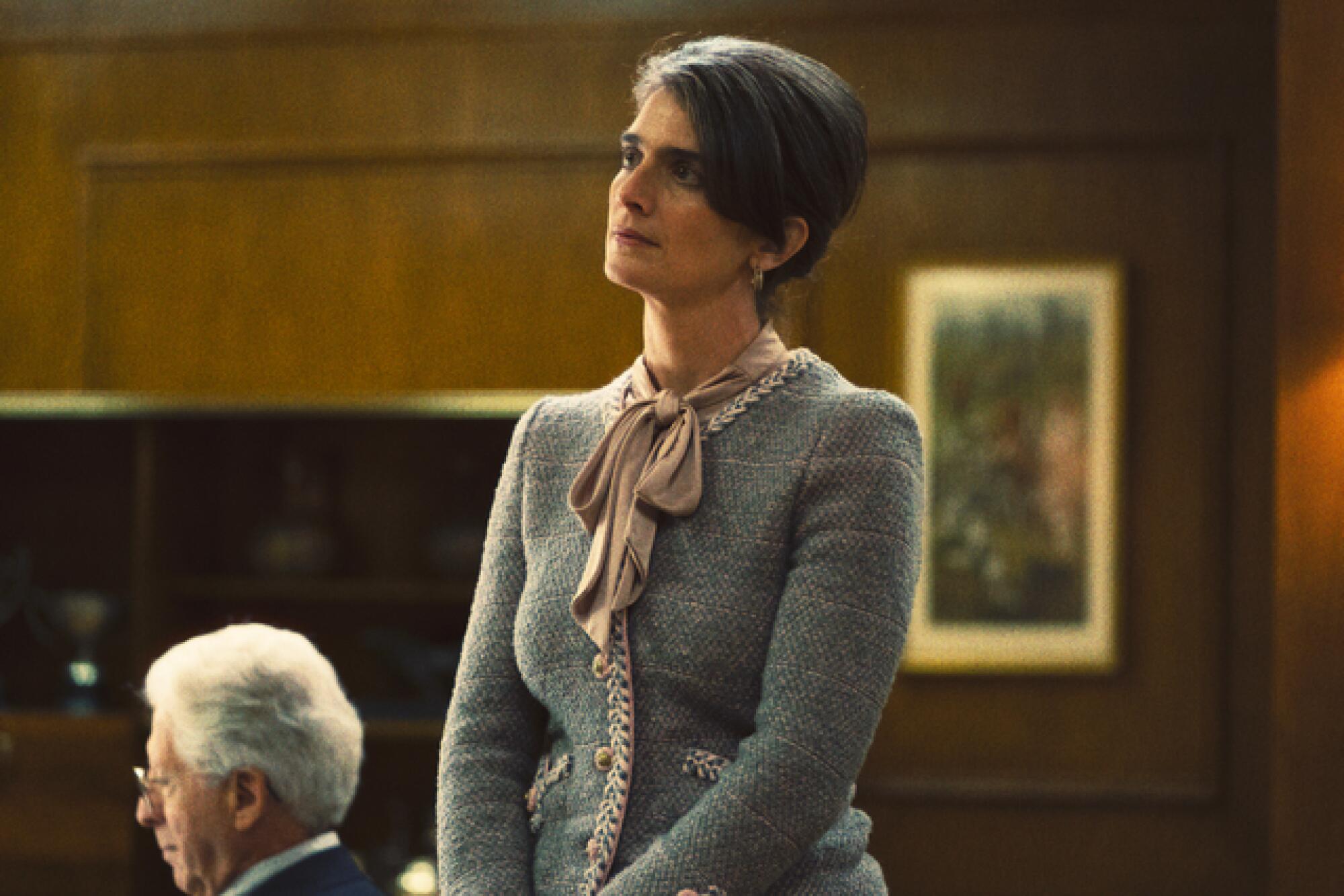
Brennan: The thing that struck me about the way that she described it was that it felt so restrictive, almost like a metaphor for what Rothman and women of her generation would’ve faced in the office working mostly with men.
Jerry [Buss] sees in Claire an extraordinarily talented businesswoman who can execute his vision for Showtime. And what Claire sees in Jerry is, one, an opportunity to escape the jerk and hideous sexist Jack Kent Cooke, and, two, an opportunity to achieve levels of power and agency at work that would have been available to very few women in 1979.
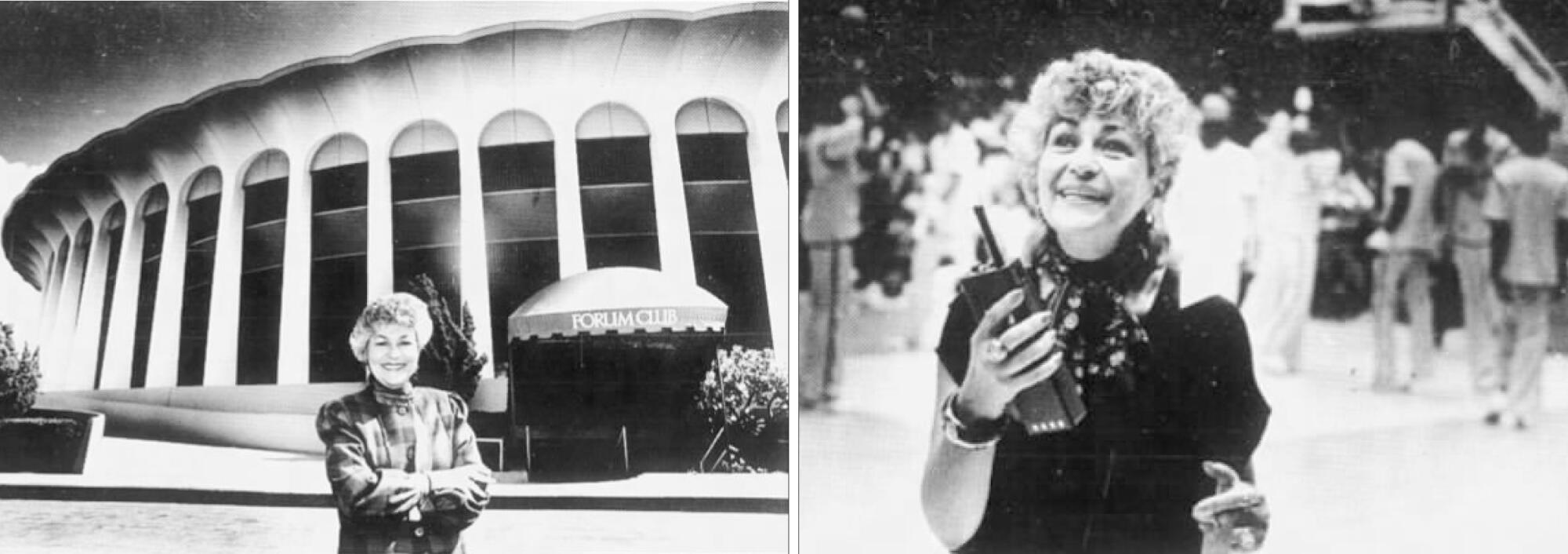
But if we’re going to grapple with how the show treats its women characters, we really need to talk to the people who helped shape them. Like Gaby Hoffmann.
Hoffmann: I thought a lot about this when we were shooting, because it is uncomfortable. How do you accurately depict a time when the culture was an oppressive and misogynistic space for women while still being responsible and not exploitative? We can’t just say, well, this is what it was like then.
Brennan: Or like “Winning Time” writer Rebecca Bertuch.
Rebecca Bertuch: I think for the female characters — ultimately the way I approach our show, and I don’t think this is how everyone does, but it’s this real investigation of the costs of masculinity. The women in our show are often trying to navigate a really thorny set of psychological bulls— that comes from being in this world that is hyper masculine and s—y to women in a lot of ways.
Brennan: This week, we’re asking some big questions about the women of “Winning Time.”
Kareem Maddox: Like: Which things in the TV show are true, and which are made up?
Brennan: How do the made-up things affect our understanding of the characters?
Maddox: And maybe biggest of all, does something need to be literally true in order to be honest? And where does a TV show based on real people draw the line?
I’m Kareem Maddox.
Brennan: And I’m Matt Brennan. Welcome to “Binge Sesh.”
Maddox: We’ll be right back.
::
Maddox: So, Matt, would you agree that seen through the lens of 2022, a lot of people might find Jerry Buss problematic?
Brennan: I think he would have been seen as problematic if you were a woman even then, but yes, I agree with that premise.
Maddox: I think that in “Winning Time” to this point, they’ve done a little bit of exaggerating to make Jerry Buss seem less — uh, I think your word would be “icky” — than we otherwise might view him in the show if we were looking at it from the lens of 2022.
Brennan: Like what? Can you give me some examples?
Maddox: The character Jessie Buss in the show is like Jerry Buss’ confidant. That’s his mom. She was not alive at the time that he bought the Lakers.
[“Winning Time” clip: Jerry Buss character: Forget it. I’ll pay the loan.
Jessie Buss character: You’re broke.
Jerry Buss character: Mother.
Jessie Buss character: You knew the silly league was sinking and you bought it anyway. You tied up every dime you’ve got. I am your mother, goddammit. I’ll drag you on the lifeboat if I have to hogtie you to do it.
Jerry Buss character: Well, thanks, Mom. But I think I’ll take my chances.]
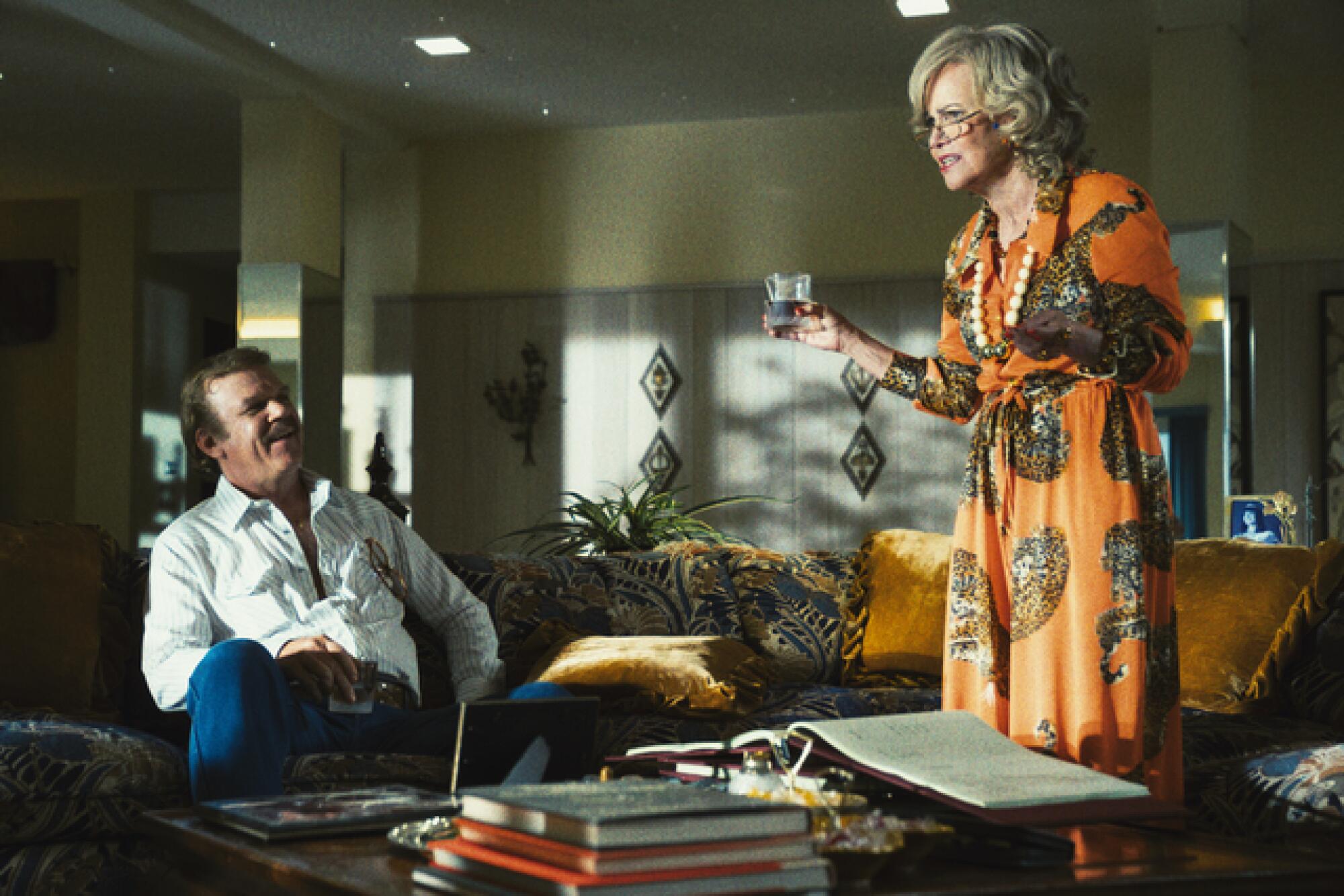
Maddox: So I think that it gave “Winning Time” the opportunity to show him in a really close, motherly relationship. Another example I think I have is: Do you remember in the first episode, when he was calling his ex-wife to beg her for money?
Brennan: Yeah, he calls Joanie to try to seal the deal with Jack Kent Cooke to buy the Lakers.
Maddox: Exactly.
[“Winning Time” clip: Jerry Buss character: When have I ever steered you wrong before?
Joanie Buss character: (laughing)
Jerry Buss character: All right. Touche. Yeah. Besides convincing you to marry me, what else?
Joanie Buss character: It’s my f—ing money.
Jerry Buss character: It’s my — I cheated on you. She was a figure skater. This call is not about our marriage. That doesn’t matter. This call is a financial call and I’m begging you.
Joanie Buss character: Uh huh.
Jerry Buss character: I’m begging you. I’m begging you.]
Maddox: Joanie, Jerry Buss’ ex-wife, is in complete control of his destiny.
In real life, Jerry Buss did make a last-minute call to get the cash he needed — but it wasn’t to Joanie. In actuality, the person on the other end of the line was Donald Sterling. Now, I’m talking about the Donald Sterling, who later went on to buy the Clippers and then in 2014 got caught on tape saying such racist things that the NBA banned him for life. That’s why in the first episode of “Winning Time” there was text that described him as the 1980s’ “second-worst Donald.”
Brennan: I bet I can guess who was No. 1.
Maddox: Donald Duck. That guy sucked.
So they acknowledge that Donald Sterling sucks but then don’t acknowledge that Jerry Buss, when he needed money in crunch time, went to Donald Sterling. There are a lot of prominent women characters in “Winning Time”: Claire Rothman. Jeanie Buss. Jessie Buss, who was, as we talked about, not alive at the time. And the amount of agency and power that they have is amplified because we see Jerry Buss as almost completely dependent on women. He’s begging his ex-wife for money. He’s asking his mom for financial advice. His daughter has one of the ideas that keeps the Lakers afloat. And it’s really, it’s not that simple.
Brennan: I am loath to take the pro-Jerry Buss position on this, but I do have a counterargument, which is that the examples that you cited — the Joanie loan in particular — are relatively small compared to something that we actually do have solid evidence for. Which is that Jerry Buss gave Claire Rothman a significant amount of authority and autonomy, and she used it to help make the Forum the epicenter of the modern NBA.
READ MORE >>> Claire Rothman: She rules the Forum
Maddox: I think the Claire Rothman character is going to emerge as one of people’s favorites, and she is a bad-ass. Objectively Claire Rothman is a bad-ass. You know, there’s a great scene where she is kind of like sitting back with her feet kicked up and she brings Jeanie Buss in and says, you know, is your dad like the rest of these guys?
[“Winning Time” clip: Claire Rothman character: Dando Abrigado, a kid I knew in grade school. First boy whose dick I saw — not by choice. He’d run around the lockers, flashing all the girls, screaming, “Take a good look. Remember this. Remember this!” It didn’t leave a big impression, but he did. Dando. I have been meeting Dandos my whole life. They usually park their asses back in that corner office.]
Maddox: Claire’s character doesn’t seem to have much of a shot at the corner office. But she does see a chance for something better than what she’s had until this point.
Hoffmann: She’s raised two kids. She’s been divorced. She’s been doing this job — worked her way up, of course — for a couple of decades, maybe more. She knows the game, right? She is obviously well experienced with the gender dynamics. That’s a polite way of saying it. The outrageous misogyny.
This is all speculation on my part, of course, but I sort of imagine that when we meet Claire in the beginning, when Jack Kent Cooke is still around, she doesn’t see herself getting much further. Right? And I can’t imagine how frustrated she must feel, how exhausted she must be by putting up with all the nonsense. I came to think of her as sort of this coiled spring.
And then Jerry Buss shows up. And obviously she sees all of the difficulty. She gets a glimpse of who this guy is and how he operates. Obviously he’s all of these things on the one hand, but on the other hand, I felt sort of seen and known by him. I think she feels like, “I don’t know exactly what this is, but it’s something new. It’s something different. It’s definitely better than what I’ve known before.”
Brennan: Then there’s the show’s handling of the Jeanie Buss character. The role that Jeanie played in building the Lakers organization isn’t exactly right in “Winning Time” — she wasn’t a key player in 1979. But she did work her way up in the ’80s, and now she’s in charge of the whole shebang. “Winning Time” drew inspiration from that — it wanted to show us a glimpse of the mogul Jeanie has become, so it showed her influence starting earlier than it actually did.
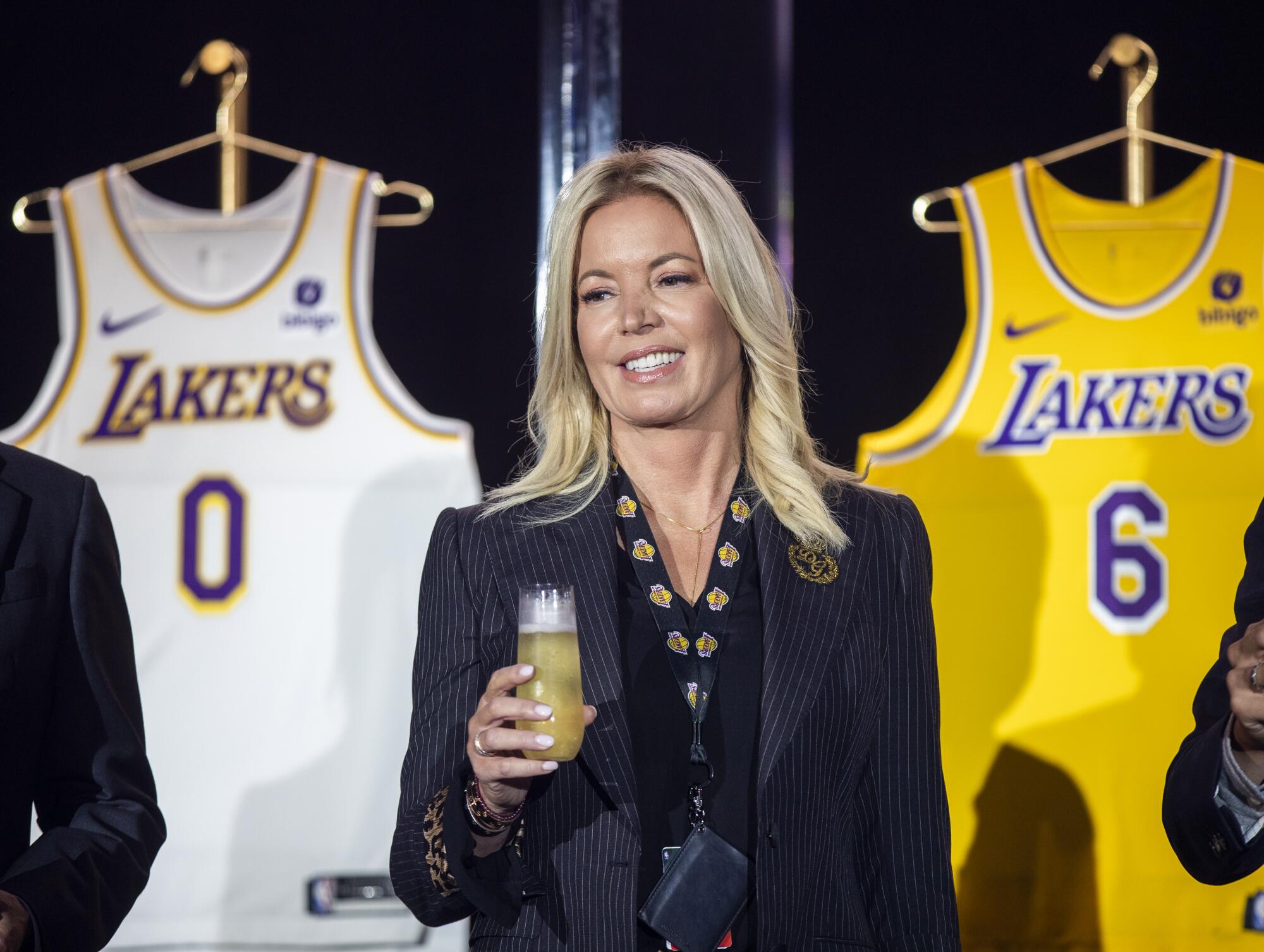
Maddox: Oh, her character talks about why she wants to follow in her father’s footsteps when she’s smoking a doobie in the basement with some of the other lower-level Lakers employees.
[“Winning Time” clip: Jeanie Buss character: I look at my mom and, you know, she, she has all her charities and her lunches at the club, and honestly, that’s all she’s ever been. I love her more than anything, but nobody needs her. Not like people need my dad. And all those years she spent raising us? My dad, he, he spent chasing what he wanted.
Linda character: F—.
Jeanie Buss character: What?
Linda character: I don’t hate the boss’ daughter.]
Brennan: Rebecca Bertuch explained why the writers thought that teenage Jeanie should have more responsibility in the show than she may have had in real life.
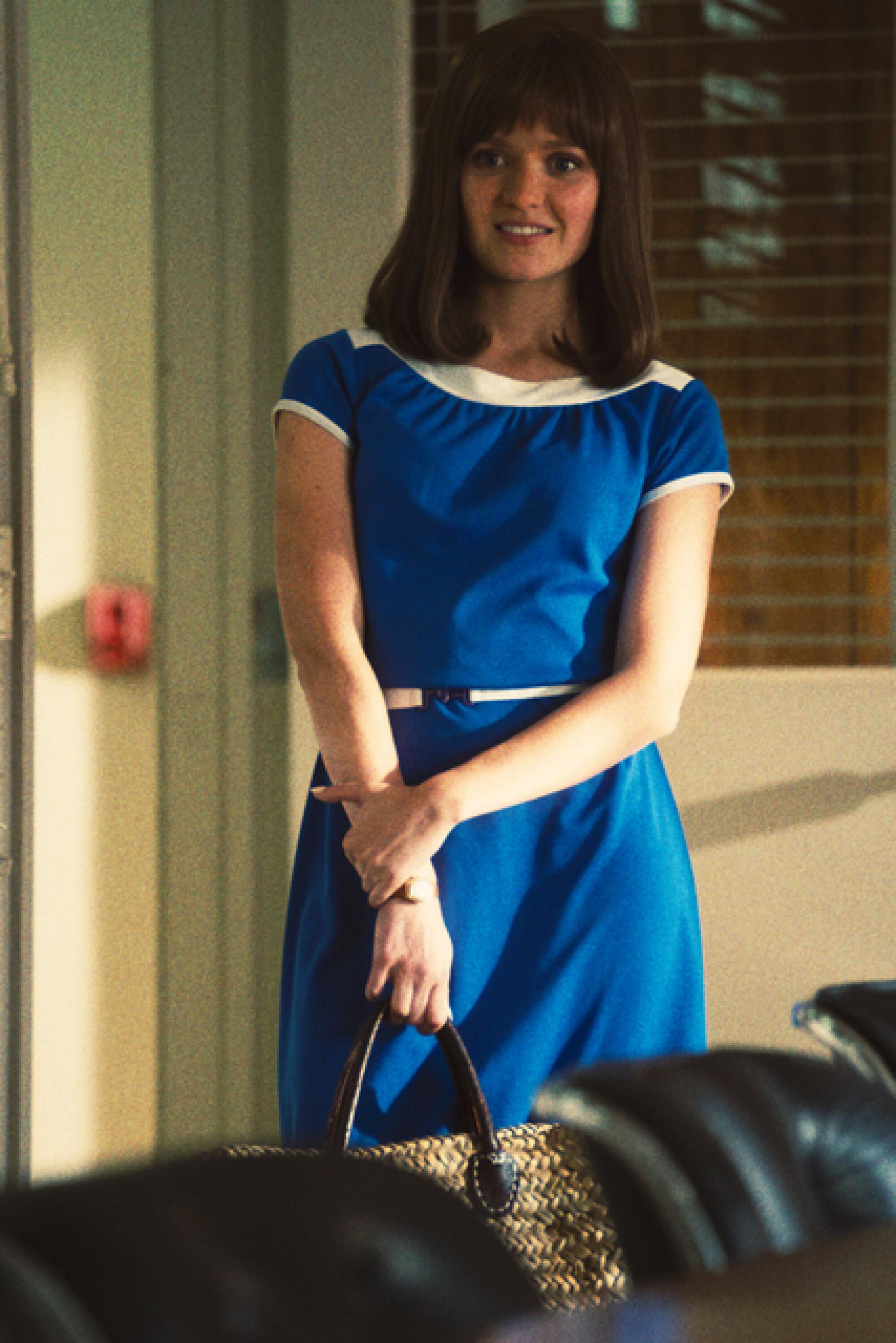
Bertuch: There’s so many men that get to be mythic figures in our show that we’re unpacking and understanding. A lot of our show is examining the effect that masculinity has on these people and the parts of themselves that they have to kind of silence or hurt to achieve the success that they think will fulfill them. And I think part of that is understanding how [Jerry] Buss’ actions as a character shaped the people around him.
Jeanie has this really fascinating person in general because she’s charted a really unique path in a really masculine male world. And she’s incredibly smart. And as she kind of took the mantle from Buss, I mean, she took so many things about him and ran with it and made it profitable and interesting. I think showing the origin of that was really important to us because we know where she goes, we know who she becomes.
Our dramatized version of Jeanie is going through this moment where she’s — it’s that moment where you’re a kid and you idolize your dad. And especially when her dad is such like a larger-than-life figure and is such a romantic and talk such a big game and is very easy to love. And I think having Jessie as this counterbalance to kind of show her that there’s a darker side to the way that he handles his life, handles his money, handles women and the expectations.
READ MORE >>> Jeanie Buss: The most powerful woman in sports
Brennan: And here’s the thing: The show doesn’t shy away from Jerry Buss’ womanizing. We see the discomfort that his behavior caused the women who were around him — including Jeanie.
So to me, what the show is doing is asking you to live in the discomfort of having someone who achieved something that’s really near and dear to Lakers fans, certainly, who was problematic. “Can the protagonist of your TV show be a problematic fave?” is essentially the question that “Winning Time” asks.
Bertuch: I completely understand. I grew up in a very specific experience of watching people around me. I had a lot of male figures around me that I was like, why are you doing that? Why is that a thing that you feel like you need? And I think, first of all, John C. Reilly’s performance — it’s really hard to dislike Jerry Buss, but he also brings in, he doesn’t shy away from the thing driving all of that posturing and the girls and this whole shtick that he’s got.
I think that asking the question of why is like a more interesting kind of pursuit for us. Like why do these guys feel like they need success? Why do they feel like they need the women to bolster that?
No one is built in a vacuum, and Buss is a product of a lot of different stuff, but his relationship to women is really complicated. And the way that his actions shaped the women around him and challenged them, I think is really interesting to see from those female characters’ perspectives.
Maddox: So we’ve torn apart what’s real about “Winning Time’s” women characters and what may have been embellished just a touch. But I’m curious as to why those choices were made.
Brennan: You’re in luck. We’re about to hear from a guy who teaches a course on that very thing — right after the break.
Maddox: Yippee.
READ MORE >>> Lakers’ Jeanie Buss tells Patt Morrison about life at Pickfair mansion
::
Brennan: Welcome back to “Binge Sesh.” So, Kareem, since so much of “Winning Time” walks the line between truth and, um, creativity, I interviewed James Goodman, who is a professor at Rutgers University Newark and an expert in the relationship between history and fiction. One thing Goodman explores in his work is that there is no form of nonfiction narrative that has only one truth — that you could tell in only one way — because everyone who experienced that event experienced it through a different lens or from a different perspective.
Jim Goodman: It’s a moving target. It’s not a fixed line. You bring in 10 historians, you’re going to have 10 different views of this. I think it depends in part about the subject. It depends in part about the stakes. If you know Abraham Lincoln or Jerry West was in a place at a particular time and said a particular thing to somebody, you don’t change it for dramatic effect if you are thinking of yourself as a card-carrying historian.
At the same time, filling gaps where there is no record of where Jerry West was and what he said — to me, that’s a different matter. The historical record is more gap than it is substance, and there’s lots of room for imagination.
Brennan: Which I think you get in a literal sense in “Winning Time,” in that Jerry Buss is not the only person who talks to the camera and tells you what he’s thinking. You get that from Claire Rothman. You get that from Frank Mariani. You get that from other characters.
[“Winning Time” clip: Jack Kent Cooke character: Just get it done so I can give the c— her f—ing money.
Claire Rothman character: Oh, I am not the c— he’s talking about. That’s his soon-to-be ex-wife.]
Brennan: Gaby Hoffmann told us what that stylistic choice, which we see for the first time in Episode 1 of the show, is telling us about “Winning Time’s” multiple perspectives.
Hoffmann: You’re like, oh, OK. Oh, OK. We’re going to get in on that lady. We might not get it a lot in this first season, but we know — we’re being given a little promissory note, I feel like, by the show, of — you have access to this person’s inner experience, and that is going to be one of the key defining elements of how this story gets told. And that immediately, to me, deepens and enriches the experience.
Maddox: Some of the most impactful moments in “Winning Time” were fictionalized, but like Professor Goodman told us, maybe it’s OK to use our imagination to fill in the gaps. Take Jeanie being this fountain of good ideas that helped get the Showtime Lakers off the ground. Like in Episode 4, where she plays a key role in the creation of what would become the Laker Girls.
[“Winning Time” clip: Claire Rothman character: A cheer squad is a good idea — for 1963. Our girls are tailored for the ’80s. They’re sexy. Cool. They won’t cheer. They’ll dance.]
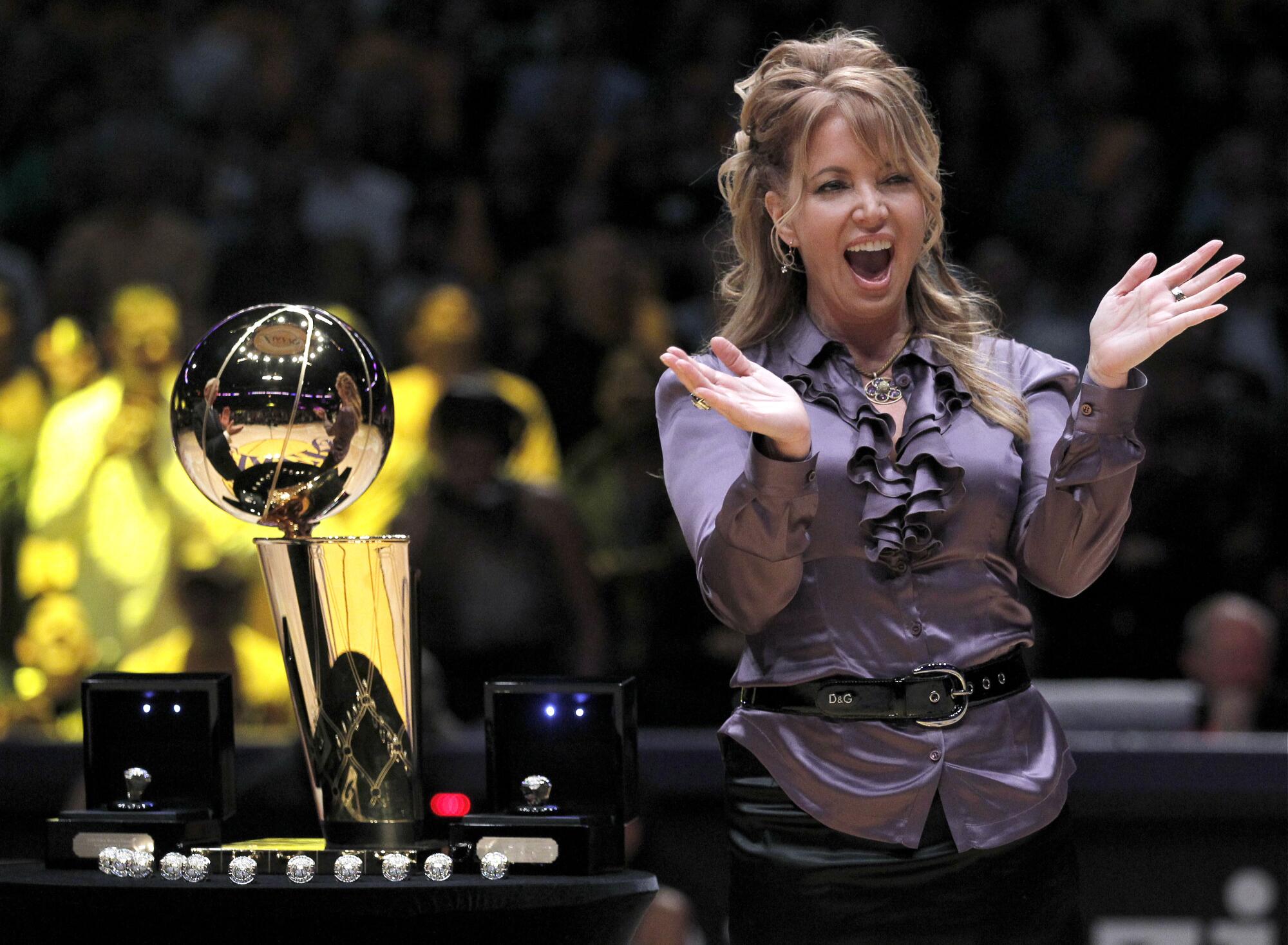
Brennan: And the same is true of Jessie Buss, who really was very close to Jerry, and who really did keep the books for the Mariani-Buss real estate empire for a time. The way that “Winning Time” co-creator Jim Hecht explained it was, like, they wanted to capture the emotional truth of that relationship.
Jim Hecht: The fact of the matter is she died two or three years before that season. So it’s a dramatic liberty. We felt like, one, it was a very important relationship to him, forming who he was and the things that he wanted. You know, that was our analysis of Jerry Buss, that there was this constant desire to make his mom proud and do right by her because she had had a lot of people do wrong by her.
The key relationship, I think, that formed him into becoming a man is the relationship that he has with his mom. But to us, it was like, you needed to understand that relationship to understand the essence of the man. And even though they occur in the same timeframe in the story, and we moved some things around to make that happen, there isn’t a lot of factual intersection between the Laker story and the personal story that he has with his mother. So rather than do it as like flash forwards and flashbacks, we set them in the same time period. Even though it’s not, you know, the dates are not correct, I feel like it’s true to the story entry to the man that he was and true to their relationship.
Maddox: So if you nitpick it, some of these liberties the writers took don’t add up to the real-life story of Jerry Buss. But it’s undeniable that he was a visionary when it came to sports entertainment. It was true that Magic Johnson was a generational talent, which is a phrase I’ve heard a trillion times lately.
And you can almost say the same about Claire Rothman. She deserves a ton of credit for what Showtime became. And she’s getting that respect now in “Winning Time.”
Bertuch: Claire Rothman is a f—ing legend. I mean, she broke barriers that people didn’t think would ever be broken and she kicked ass and was notorious and well-known in her line of work for being that girl.
So I think [Jerry] Buss’ thing is that he’s a very smart person who respects people for being smart in our show, and he wants the best, and Claire is the best, so he’ll prop her up. And I think that his relationship with Jessie is kind of like — part of why we built up that character was to show that his relationship to women is not cut and dry, of like, “women are sex objects.” His relationship with his mom is really complicated and nuanced. And he recognizes, I think, an intelligence in Claire and a usefulness in her.
And he has such big goals and aspirations that he just wants to build basically like he does for basketball, the best team possible. His reputation with women casts a big shadow. And so she’s really cautious about it, but her learning to kind of find her place and trust him and see a future in working with Jeanie is something that develops over the course of this season.
Brennan: “Winning Time” gives Claire Rothman what she deserved all along, which is recognition for how instrumental she was in the creation and success of the Showtime Laker phenomenon. And she’s the one character in the show who I think gets that more from the show than she did from history. I’m glad that many, many more people will know the name Claire Rothman after watching “Winning Time” than they did going in, even if it doesn’t get every literal fact about her right. And if Claire is the least known of the major “Winning Time” characters, the most maligned is probably Kareem Abdul-Jabbar, and it corrects the record on him too.
Maddox: Next week on “Binge Sesh.”
::
Brennan: So, Kareem is traveling for a wedding this week which I feel means that I get to use the post credits time as I wish. So I’m going to talk a little bit about a show that I love called “Mad Men.” And the reason “Winning Time” reminds me of “Mad Men” is really only in one way, which is the relationship between Jerry Buss and Claire Rothman.
I see so much of the DNA of “Mad Men” in that relationship, specifically the relationship between Don Draper and Peggy Olson, who starts out as his secretary and eventually becomes his protege. He’s so hard on her, but he’s hard on her because he recognizes her talent.
My editor, Lauren Raab, is telling me to wrap up, and I haven’t even actually gotten to the point yet where, so, [his words begin to fade out] Claire and Peggy Olson are about the same age, they were born around the same time, they would have had the same work experiences in the ’60s.
Wait, hear me out. That relationship, oh, it’s so fascinating …
[his words fade out, then back in]
… the greatest TV drama of all time, and, hold on, don’t cut me off. Just give me a second to speak my piece and then you can fade out. I really could do a whole episode just on the ways that I imagine Claire being … [his words fade out]
Additional resources
Jeanie Buss with Steve Springer, “Laker Girl” (2013)
Pablo Goldstein, “Game 12: Claire Rothman” (2019)
Jeff Pearlman, “Showtime: Magic, Kareem, Riley, and the Los Angeles Lakers Dynasty of the 1980s” (2013)
Matthew Weiner, creator, “Mad Men” (2007-2015)
More to Read
The complete guide to home viewing
Get Screen Gab for everything about the TV shows and streaming movies everyone’s talking about.
You may occasionally receive promotional content from the Los Angeles Times.








